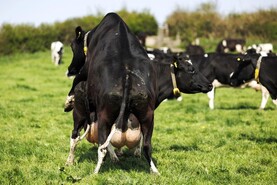Post-breeding nutrition
Addressing ewe nutrition during mating is discussed on pages 40 and 41. This feature does not discuss feeding in months two and three of gestation, the stage at which many mid-January- and February-lambing ewes now find themselves. Maintenance feeding of ewes will suffice during this period provided ewes are in adequate nutrition.
For ewes in a good body condition score of 3.5 to 3.75, feed to maintenance or slightly below maintenance levels. Ewes can be allowed to lose up to 5% of bodyweight but should not be allowed to lose excessive weight that would see them fall under a target body condition score of 3 entering late pregnancy. In terms of energy, a 70kg ewe in mid-pregnancy will require 0.8UFL to meet maintenance demands. Access to a good supply of moderate-quality grass (cleaning off paddocks before closing etc) will meet these demands, as will silage from 67DMD to 70 DMD with a dry matter intake of 1kg DM to 1.1kg DM. Ewes in excessive body condition (BCS 4 plus) can afford to lose half a body condition score which translates to about 4kg to 6kg liveweight in lowland ewes mid-pregnancy. This weight loss should be gradual and a typical diet of ewes grazing off poor-quality grass or supplemented with 65 DMD to 68DMD silage will suffice.
Where these ewes in excessive condition continue on a high plane of nutrition, it can have a negative influence on placental development and will reduce lamb birth weight as ewes become accustomed to apportioning nutrients to weight gain as opposed to placental and foetal development. Ewes in excessive condition will also be prone to more lambing difficulties due to abdominal fat around the birth canal.
TAMS tranche dates
The current tranche of the Targeted Agricultural Modernisation Scheme II closes in little under a month on 7 December 2018. With approval taking a few months on average it is worth thinking about applications for fencing jobs next spring or the purchase of sheep handling equipment. Grant aid remains at 40% with the exception of 60% for young trained farmers. It is also worth noting that there is a minimum investment required of €2,000 excluding VAT. The full list of eligible items, reference costs and associated documentation are available at www.agriculture.gov.ie/farmerschemespayments/tams. All applications must be submitted online through an applicant’s or their authorised agent’s agfood portal.
Sale of working dogs
Blessington Mart in Co Wicklow is hosting a sale of registered and non-registered working dogs on Tuesday 27 November after the sheep sale at about 1.30pm. Buyers will have a chance to see dogs working, with the auction taking place while dogs are put through their paces by their owners in paddocks on the mart premises. A puppy pen will also be present. All dogs must be microchipped and must be pre-booked with a form available on www.blessingtonmart.ie or by calling 045-865107. Entries cost €20/dog.
Read more
Farm finance: two years left in TAMS II scheme
Post-breeding nutrition
Addressing ewe nutrition during mating is discussed on pages 40 and 41. This feature does not discuss feeding in months two and three of gestation, the stage at which many mid-January- and February-lambing ewes now find themselves. Maintenance feeding of ewes will suffice during this period provided ewes are in adequate nutrition.
For ewes in a good body condition score of 3.5 to 3.75, feed to maintenance or slightly below maintenance levels. Ewes can be allowed to lose up to 5% of bodyweight but should not be allowed to lose excessive weight that would see them fall under a target body condition score of 3 entering late pregnancy. In terms of energy, a 70kg ewe in mid-pregnancy will require 0.8UFL to meet maintenance demands. Access to a good supply of moderate-quality grass (cleaning off paddocks before closing etc) will meet these demands, as will silage from 67DMD to 70 DMD with a dry matter intake of 1kg DM to 1.1kg DM. Ewes in excessive body condition (BCS 4 plus) can afford to lose half a body condition score which translates to about 4kg to 6kg liveweight in lowland ewes mid-pregnancy. This weight loss should be gradual and a typical diet of ewes grazing off poor-quality grass or supplemented with 65 DMD to 68DMD silage will suffice.
Where these ewes in excessive condition continue on a high plane of nutrition, it can have a negative influence on placental development and will reduce lamb birth weight as ewes become accustomed to apportioning nutrients to weight gain as opposed to placental and foetal development. Ewes in excessive condition will also be prone to more lambing difficulties due to abdominal fat around the birth canal.
TAMS tranche dates
The current tranche of the Targeted Agricultural Modernisation Scheme II closes in little under a month on 7 December 2018. With approval taking a few months on average it is worth thinking about applications for fencing jobs next spring or the purchase of sheep handling equipment. Grant aid remains at 40% with the exception of 60% for young trained farmers. It is also worth noting that there is a minimum investment required of €2,000 excluding VAT. The full list of eligible items, reference costs and associated documentation are available at www.agriculture.gov.ie/farmerschemespayments/tams. All applications must be submitted online through an applicant’s or their authorised agent’s agfood portal.
Sale of working dogs
Blessington Mart in Co Wicklow is hosting a sale of registered and non-registered working dogs on Tuesday 27 November after the sheep sale at about 1.30pm. Buyers will have a chance to see dogs working, with the auction taking place while dogs are put through their paces by their owners in paddocks on the mart premises. A puppy pen will also be present. All dogs must be microchipped and must be pre-booked with a form available on www.blessingtonmart.ie or by calling 045-865107. Entries cost €20/dog.
Read more
Farm finance: two years left in TAMS II scheme






 This is a subscriber-only article
This is a subscriber-only article










SHARING OPTIONS: